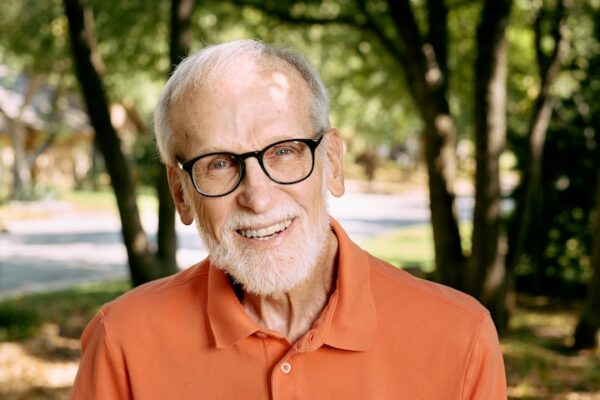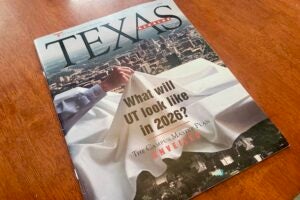by Michael Agresta
photo by Dé Randle
When Mark Holt, Plan II Honors ’72, was growing up in the Permian Basin and the Texas Panhandle, he didn’t always love that his father was a doctor. He depended on his dad for rides from school to the family home outside Earth, a tiny town about 40 miles northwest of Lubbock with a population of just over 1,000. Mark remembers waiting in the car — sometimes for hours — while his father worked overtime making house calls.
“I saw my dad going to people’s houses after he’d been in the office all day,” he says. “The downside for me was that sometimes it meant that I would get home at 7 or 7:30 p.m.”
As he grew older, Mark came to reflect on what his father’s diligent care meant to the often low-income people he served. That recognition has shaped his own life as a pediatrician in North Texas, as well as his decision to endow a scholarship for pre-med students in the Plan II Honors Program.
“It was a learning experience in terms of his dedication to what he did,” Mark says of those long, dusty afternoons waiting for his father to complete his rounds. “And he was very good. It was not the most efficient thing from the standpoint of having some free time. But I heard people all the time that would say, ‘Hey, you’re Dr. Holt’s kid. He was really great taking care of my wife’s diabetes.’ I got a lot of positive feedback like that.”
Still, when Mark finished high school in 1968, he was eager to explore other career options. He’d watched as the stress of the medical profession wore on his father, who at times was responsible for the whole gamut of small-town needs, from emergency care of automobile accident injuries to delivering babies. The family’s financial situation had often been precarious too, especially before the widespread adoption of health insurance gave doctors better hopes of getting paid in dry years. “We weren’t country club people, though I don’t think there was a country club in McCamey or Springlake or Earth anyway,” he jokes.
Arriving at UT as a student in the Plan II Honors Program, Mark initially took classes in English and psychology. “I basically said, ‘You know what, I’m dadgum sure I’m not going to be a doctor!’”
Whatever you do, you're not doing it just for yourself.
Mark’s memories of life at UT are full of the dramatic ups and downs of the era, from celebrating the national championship in football in 1969 to witnessing a major campus protest after the Kent State shootings in 1970, and even being teargassed as a curious onlooker. “I don’t think there’ll be another class that participates in a national championship and also sees that kind of huge protest,” he says. “I felt pretty fortunate, and a lot of things I learned are still very applicable.”
Mark worked throughout college, washing dishes at private residence halls for his dinners and for a little spending money. It was also at UT, on the then dirt track behind Jester Hall, that he picked up his lifelong love of running. As an adult, he’s run more than 15 marathons, including several in Boston and New York.
In terms of academics, Mark took his time settling on a path in life, taking advantage of the flexible curriculum in Plan II, which he recalls fondly as “kind of an upper-level version of going to Luby’s Cafeteria — you can choose the courses you want to take.” At the same time, he was receiving letters from high school friends stuck in rainy foxholes in Vietnam. Before long, Holt began to see the positives of extending his studies at medical school and carrying on the family tradition.
“It was not an enthusiastic ‘Yay, this is what I’ve wanted to do this all my life.’ It was, ‘Okay, I know I can handle this,’” he explains. Still, he adds, “I’m a great believer in serendipity. You know, things happen for a purpose, but sometimes not in the way you’d counted on. I enjoyed being a pediatrician, and I wouldn’t trade it for the world.”
 Before retiring, Mark practiced in the Lewisville area of the Dallas-Fort Worth metroplex for about four decades. This allowed him to build deep connections to the families he worked with, often over multiple generations.
Before retiring, Mark practiced in the Lewisville area of the Dallas-Fort Worth metroplex for about four decades. This allowed him to build deep connections to the families he worked with, often over multiple generations.
“It gives you a sense of continuity,” he says. “You know the family — their background and the kinds of challenges they’ve had — and you know what expectations are built in from their parents, who are now the grandparents. That’s meaningful.”
Mark did not enter the medical profession expecting major financial rewards, given his father’s experience. But as he built up his practice — and stayed humble in other habits, including remaining in the same house for over 40 years — he found himself well rewarded financially.
“I’ve always felt really fortunate for that,” he says. “But I’ve also learned that whatever you do, you’re not doing it just for yourself.”
Helping Others Flourish
Out of a desire to give back to others who want to become doctors but might have grown up with limited financial resources, Mark made his gift in 2021 to support pre-med students enrolled in Plan II. Students will be selected by the Plan II director or their designate; support may include tuition, housing and food, and experiential learning, such as study abroad.
“It is so gratifying to receive this support from Mark, on two levels,” says Alexandra Wettlaufer, director of Plan II and professor of French and comparative literature. “It’s wonderful to see the impact that Plan II has had on his life, and then also to see how his gift will make an impact on our students going forward. His life has been about caring for others, and this is such an important extension of that.”
With his gift, Mark hopes to see many future doctors flourish and attain the same rewarding career he found, beyond what his teenage self might have dreamed. “It was a profound thing, being in a position to donate in a way that would be meaningful,” he says. “And not only to support students going through UT now, but also other kids on down the line.”




